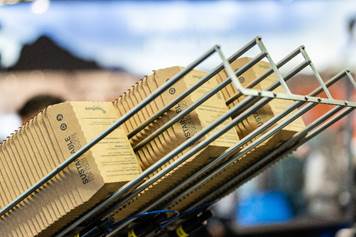Metsä Board, part of Metsä Group, is bringing the market an improved version of MetsäBoard Classic FBB, pushing the industry forward with its higher-than-ever print quality and a lower-than-ever carbon footprint.
Sidebar
Print and Packaging


Practical sustainability: more efficient production and improved resource conservation
The meat processing industry is a sector characterised by high energy, water and material consumption. Therefore, production and packaging processes should be as sustainable and resource efficient as possible. This is not only good for the environment, it also increases efficiency and cuts costs. The world's leading trade fair for the sector, IFFA – Technology for Meat and Alternative Proteins, is showcasing the technologies used for this under the top theme of ‘Putting sustainability into action’.

Sustainability in the Plastics Industry
Plasma technology as the key to greener processes

Sustainability – the power of three: Moss, Multipanel UK and Perspex Distribution celebrate ACP closed loop recycling success
Following the launch of its closed loop scheme in 2024, Moss has celebrated the results of its first collection of Aluminium Composite Panels (ACP) with over six tonnes of plastic and 4.3 tonnes of aluminium recycled. Together with Multipanel UK and Perspex Distribution, the initiative underscores the dedication to minimising waste and maximising resource utilisation across the three businesses and throughout the supply chain.

Reaching for the stars: Quadpack Foundation launches Project Orion
A new social impact programme connects companies, NGOs and young people in vulnerable situations to improve their job prospects and promote inclusivity
Ahlstrom publishes its Sustainability report 2024
Ahlstrom, a global leader in fiber-based specialty materials, has released its Sustainability Report 2024 today. The report covers Ahlstrom's performance and recognitions in key areas of sustainability and provides insights into Ahlstrom’s strategy and transformation.
Valmet launches new advanced process control for maximizing pulping yield
Valmet introduces Valmet High Yield Pulping Optimizer, the world’s first advanced process control for optimizing high yield pulping. Designed for chemical brown pulp producers, the optimizer is a unique combination of automated controls for cooking and refining that helps mills achieve high pulping output while cutting costs and stabilizing quality.

Esko addresses rise in sustainability regulation in packaging through co-hosted webinar with CarbonQuota
Webinar addresses the number one challenge facing today’s converters

Valmet DNAe awarded as the world’s first fully web-based DCS with ISASecure SSA cybersecurity compliance
Valmet has reached a significant milestone in industrial cybersecurity with its Valmet DNAe Distributed Control System (DCS): it is the world’s first fully web-based system to receive the ISASecure System Security Assurance (SSA) Security Level 1 certificate.

UPM packaging papers achieve recyclability certifications in Europe and the U.S.
UPM Specialty Papers is proud to announce that its packaging papers have been certified as recyclable according to both European CEPI and U.S. WMU testing methods. All UPM barrier papers, barrier base papers and flexible packaging papers have successfully passed the new CEPI recyclability test. These papers are technically recyclable in a recycling mill with conventional process according to CEPI-Scorecard version 2.0 (January 2025).

A verified study shows that Metsä Board paperboard can reduce carbon footprint of food packaging by over 60%
According to a recent life cycle assessment* conducted by Metsä Board, switching from white-lined chipboard (WLC) to Metsä Board’s folding boxboard can reduce the carbon footprint of food packaging by over 60%. The LCA study, which compared MetsäBoard Classic FBB to corresponding grades available in European markets, was verified by the IVL Swedish Environmental Research Institute.

 Deutsch (Germany)
Deutsch (Germany)  Polski (PL)
Polski (PL) 






